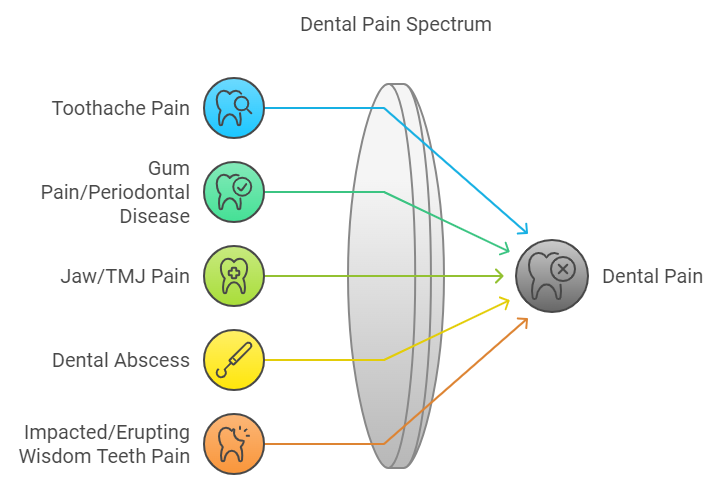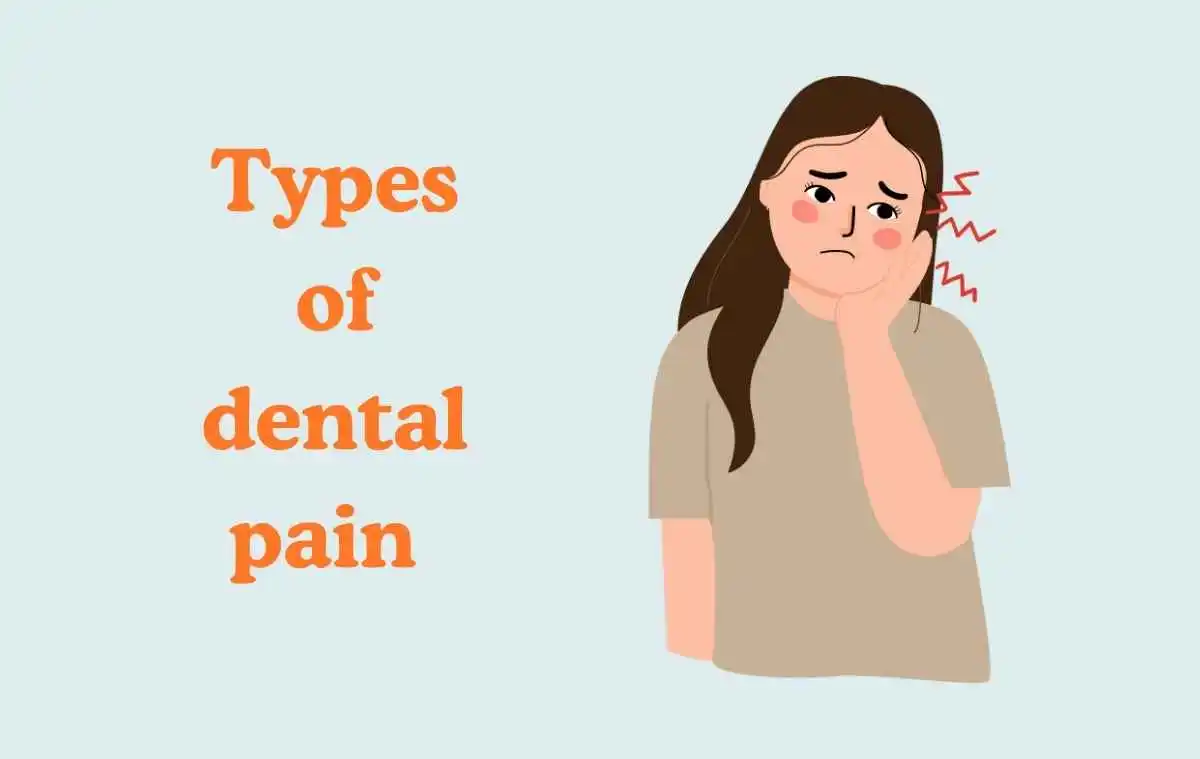Toothaches andoriginating from the mouth can ruin even the best day. When dental pain arrives, it’s important to correctly identify the types of dental pain so the right treatment solution can be found.
Different issues within the teeth and jaw manifest as distinct sensations that an experienced dentist can decipher.
This guide will explore the most typical types of dental pain seen in dental offices. We’ll explain what structures are involved and what may be creating the problem. Knowing how dental pain can vary will help you better communicate symptoms to your oral care provider.
Their proper diagnosis is key for effective relief and preventative care. Here take a look at common tooth and jaw pain types caused by conditions affecting the nerves, gums, teeth, and joints.
What causes a toothache?
There are a few different things that can lead to a toothache, man. Nothin’ good, but it’s usually from something messin’ with the inside of your tooth.
Tooth decay is a big culpritf your tooth, If it goes deep enough, it irritates the soft pulp inside. Dead nerve fibers = tooth pain, know what I’m sayin’?
Cracks in your teeth can also let in those cavity-causing germs. Too much chompin’ hard stuff or even grindin’ your teeth at night puts stress that causes cracks over time.
If you’ve got gums that are inflamed from gum disease, that can irritate the ligaments holding your tooth in place.
Sometimes it’s just sensitivity. Your enamel gets all worn down from acid or brushe’ too hard, leavin’ the soft dentin exposed. Then even cool water triggers it.
5 Types of types of dental pain You Shouldn’t Ignore

Toothache Pain
Toothache pain is usually a sign of decay or damage to the inner tooth. It occurs when bacteria from cavities or cracks enter the soft pulp inside. This causes inflammation that sensitizes the pulp. Pain increases with hot/cold stimuli pressing on the tooth.Before ya know it, your nerves are screaming in agony, especially when you eat or drink something hot or cold.
The pain just pulses and pulses, keeping you up all night long. If you let it go too long, it could even turn into a nasty abscess! But don’t you worry none, just head to the dentist pronto. They’ll take a look inside and see if you just need a simple filling or maybe even a root canal to save the tooth. Once that infected pulp is gone, so is the pain. So do yourself a favor partner – no need to tough it out, just get to the dentist to get that toothache fixed up right!
Gum Pain/Periodontal Disease
Gum pain from periodontal disease. Gums become swollen, red and bleed easily when brushing or flossing with gingivitis. As it progresses to periodontitis, gums pull away from teeth, forming pockets.
Bacteria in pockets further infect and inflame gums, ligaments and bone. Pain increases with chewing from damaged tissues and bone loss over time. Untreated can lead to loose teeth or tooth loss from deteriorating bone.
Seeking professional cleaning crucial to fully remove bacteria causing infection. Saltwater rinses or tea bags may relieve mild pain temporarily at home. Ignoring risk of pain advancing to serious gum and tooth loss issues.
Jaw/TMJ Pain
Often triggered by teeth grinding (bruxism) during sleep or over-straining jaw muscles. Symptoms involve pain or tenderness in jaw muscles/joints,lockjaw, headaches or earaches. Causes may include misaligned bite, repetitive stress on jaw, arthritis or congenital factors
Dental Abscess
May follow tooth decay or periodontitis as infection tracks down into soft tissue/bone. Usually begins as mild pain but can worsen rapidly to severe throbbing or swelling. Occasionally causes fever, swollen lymph nodes or severe pain radiating to ear/neck. Requires emergency treatment like root canal therapy or tooth extraction
Impacted/Erupting Wisdom Teeth Pain
Common as third molars come in partially or remain trapped under gums/jawbone. Early symptoms of pericoronitis include mild gum swelling, bad breath and sensitivity. Can progress to severe throbbing pain, swelling or difficulty eating if left unattended.Surgery may be required to remove impacted/problematic wisdom teeth.
By consulting a dentist at the first signs of pain, minor issues are easier and cheaper to remedy before developing into complex infections or advanced gum/bone disease. Don’t assume dental pain will simply go away on its own.
How do dentists treat toothaches?
PaFor short-term relief prior to definitive treatment, over-the-counter medications may be recommended. Ibuprofen helps reduce swelling/inflammation while acetaminophen relieves throbbing pain. Codeine can provide stronger relief for severe cases. Antibiotics may treat associated infection.
Tooth decay or fracture often leads to pulp infection causing pain. A root canal cures this by removing infected pulp via small instruments and filling/sealing the now-empty pulp chamber and root canals. This eliminates the source of infection/pain.
In cases of advanced decay, cracks or periodontitis, extracting the entire tooth may be the quickest pain solution. Antibiotics given beforehand help control infection risks from extraction socket healing.
Exposed cavities/cracks are temporarily filled with a material like zinc oxide eugenol to cover raw, sensitive dentin until a permanent filling can be done. This soothes pain immediately.
Home remedies for Dental Pain
Here are a few remedies people say can help:
- Cloves . Take a clove and chew on it or hold it near the achin’ tooth. The eugenol in cloves has numbin’ properties.
- Tea Bags . Black or green tea bags contain tannins that can soothe inflamed gums. Let it steep then bite down on a soggy bag held to the tooth.
- Salt Water Rinse . Dissolve a teaspoon of salt in glass of hot water. Swish around your mouth for an hour for the antiseptic effect.
- Orajel . This over-the-counter gel contains benzocaine to numb the nerve endings in your tooth temporarily. Rub some directly on the sore tooth.
- Pain Relievers . Acetaminophen or ibuprofen can help ease toothache as well, just be careful about dosing.
- No home remedy replaces a dentist for actual treatment, but these may get you some relief until the pro can check it out. Hope the tooth pain chills out soon!
Key takeaways
- Toothaches caused by decay, cracks or gum disease irritating tooth pulp.
- Gum pain from gingivitis and periodontitis damaging gums and bone.
- TMJ issues cause jaw muscle and joint tenderness.
- Abscesses need emergency care for infection spread risk.
- Problem wisdom teeth commonly cause throbbing pain and swelling.


1 thought on “Types of dental pain and What You Can Do”